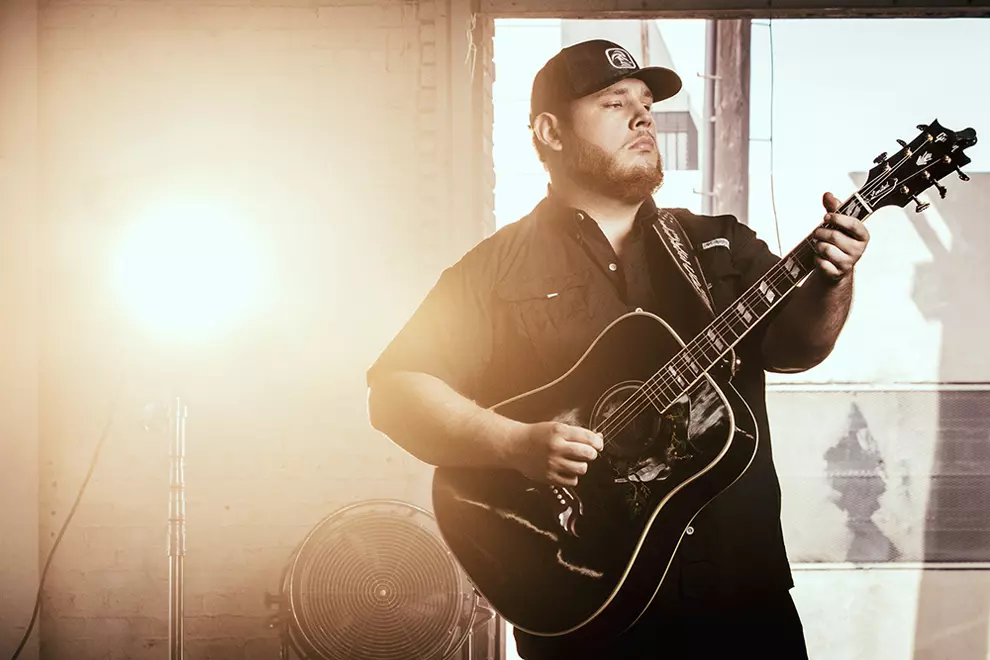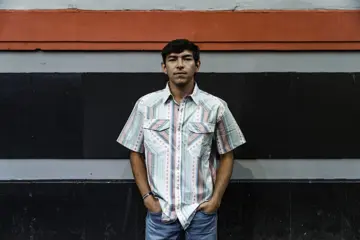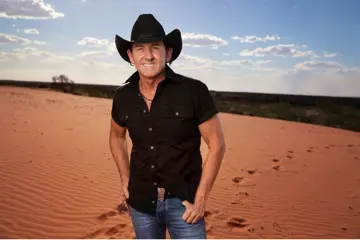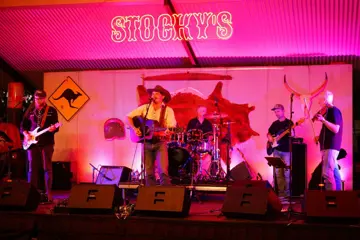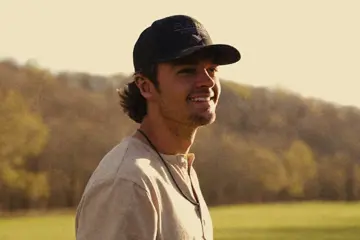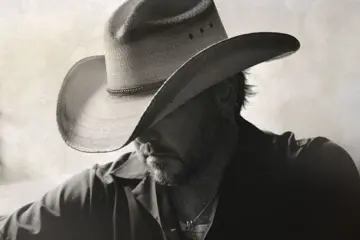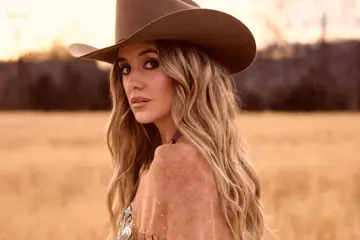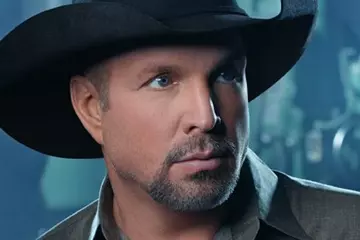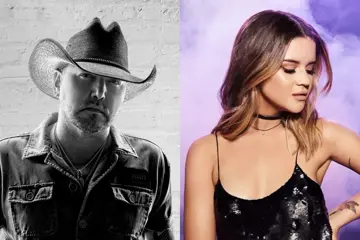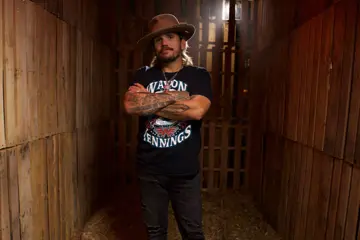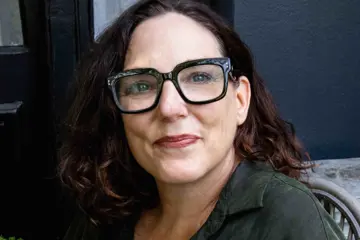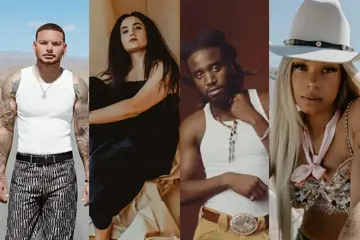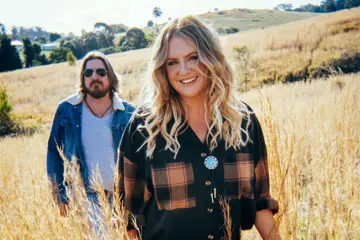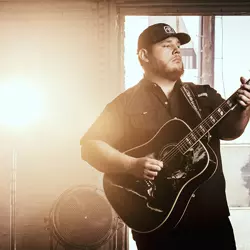 Luke Combs
Luke CombsTwo minutes into The Music's conversation with Luke Combs, the distinctive crack of a gunshot rings out. Rather than immediately go into panic stations, however, the stadium-filling country star barely bats an eyelid. “Oh, that?” he says nonchalantly after a beat. “Yeah, they're far away. All good. We're in the country, bro! That's normal out here.” It's a timely reminder of Combs' everyman status – this might be the biggest name in contemporary American country, but he's still a North Carolina boy shooting the shit in his man cave while hunters are literally shooting in the forest nearby.
Combs makes a lot of where he's come from in contrast to where he is now, and that takes centre stage on his third studio album Growin' Up. The reflective, often introspective songwriting simultaneously maintains Combs' knack for big-rig choruses – expressing the innermost to the outermost in a very literal sense. When asked what he hoped to achieve with Growin' Up, Combs points to a need for exploration that pairs with a need to maintain his own musical terrain. “I wanted to grow sonically, for sure, but I also didn't want to completely get away from the stuff that got me here,” he says.
“Look at those first two records – I mean, people fell in love with them. In a way, so did I. I wanted there to be a taste of that, as well as a taste of where I'm heading. In my own life, I'm in this transitional phase – I still feel like a young college dude, but I'm also married and I'm about to have a kid. My whole life is about to change. I feel like I've grown up alongside my fans, in a lot of ways. This album, to me, is the bridge between where I was and where I'm going.”
This combination of the old and the new is reflected in Growin' Up's collaborators. Representing the former are Jonathan Singleton and Chip Matthews, who co-produced the album alongside Combs and have individually had a hand in several of his hits. “Me and Jonathan have been writing together for a long time now,” says Combs. “He's an incredibly talented musician, and he'd already been producing a lot of the demos we've worked on – so when Scott [Moffatt] wasn't able to work on this album, I thought it'd be really cool to have Jonathan in there with me."
Join our community with our FREE weekly newsletter
As for Matthews, Combs enlisted the engineer and multi-instrumentalist due to his extensive knowledge of both him and his band from a sonic standpoint. “Chip produces all our live stuff – TV, awards shows, anything,” Combs explains. “He's a very sought-after engineer and mixer, and everything he touches of ours sounds so great.
“He and Jonathan didn't really know each other, but I wanted them to come together because I really love what each brings to the table. They're the ones in there swinging the pickaxes, as it were, but I've been super involved in the producing process this time around. The three of us get along so well, and we've made some music together that's really fun and that I really like.”
Among the new songs is album highlight Outrunnin' Your Memory, which brings us to new collaborators – in this instance, country-pop luminary Miranda Lambert. “We met at an after-party,” says Combs. “We'd run into each other a few times, and we're on the same label, but that night we really connected. I've always looked up to Miranda, so we got talking about doing a song. We wrote that one with my buddy Dan [Isbell], and when it came to cutting it in the studio, I hit her up to be on it. I think that's one that really lends itself to where I want my music to go – it's a little bit different, and it's one of my absolute favourites.”
With Combs back in an album cycle, the discourse surrounding him will inevitably start up again – both positive and negative. It's something he's all too aware of, but has made a point to not get caught up in. “Some days, I'm just completely uninterested,” he says of reviews and editorials surrounding him. “There are others, though, where I'm curious what people think – especially when you've got new music out.
“You've just gotta be careful when it comes to the creative process. I really don't think you can base any musical decisions off what you're reading. You start on this path where you're only doing things because you think it's what people want to hear and they'll only enjoy it if you do it this exact way. That's just not the way to do it – for me, I've always tried to write songs that I enjoy singing and playing, first and foremost.”
One of the funnier parts of the Luke Combs discourse has been having two of his best-known songs – Better Together and Forever After All – considered part of the “boyfriend country” movement, where male country stars pen overly-saccharine love songs to paint themselves as doe-eyed romantics. Combs grins and breaks into a chuckle when the subject is broached – it's clear that this is a conversation he's had a few times before.
“Oh, dude – Better Together is definitely boyfriend country,” he laughs. “It was never on my mind to cash in on this trend, though. It honestly came from talking on the porch with my buddies one night, as we were looking ahead to what was coming up in our lives. At the time, I was about to propose to my girlfriend. I'd written a song for her years earlier, called Beautiful Crazy, and I wrote Better Together around the time I was planning to propose. I wrote Forever After All when we'd moved into this house in Nashville – it was the first song I wrote in this place. Everyone writes love songs – mine just happen to fit with the narrative of my own life.”
Also part and parcel of the release of Growin' Up is Combs' bread and butter: Touring. Kicking off in September, Combs and his band will headline shows across a variety of North American arenas, stadiums and amphitheatres. Needless to say, it's a far cry from the bars and clubs that Combs originally cut his teeth in as a live performer – which begs the question as to how he maintains a connection with his ever-growing audience, in spite of the literal wide berth between them now. “You've got to make the people in the back feel like they're at a small show,” says Combs.
“The goal for me, since we started doing these sorts of shows, was ensuring that intimate feel translated. I try and make each show personal in its own way, not just a routine. I talk a lot and share stories, and I try my best to relate to everyone that's in attendance. There's a nuance to it, and it's the small things that can make a big room feel like a bar. It's been a huge process, but I love being able to make each show as big and as small as possible in different ways.”
